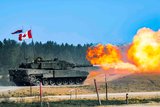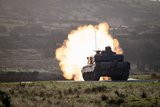Rheinmetall enters the ring for UK tank upgrade
As the deadline looms Rheinmetall has finally submitted a proposal for the UK Challenger 2 main battle tank Life Extension Project (LEP).
The company said it will partner with UK suppliers for the programme if selected, including Supacat, Thales UK and BMT.
Rheinmetall is already working on MBT upgrades for its Leopard 2 in Poland as well as upgrading ex-German Army Leopard 2 tanks for the Indonesians.
While a gun requirement is not currently part of the LEP, the company highlighted that its solution could integrate either the existing 120mm L30 rifled gun or 120mm L55 smooth bore system that
Already have an account? Log in
Want to keep reading this article?
More from Land Warfare
-
![Norway opts for Hawnwha’s Chunmoo for long-range fires under $2 billion deal]()
Norway opts for Hawnwha’s Chunmoo for long-range fires under $2 billion deal
The selection of Hanwha’s K239 Chunmoo long-range precision fires system, with a contract expected to be signed on 30 January, makes Norway the second European country to choose the system. It is expected an operational system will be in service within four years.
-
![Layered protection: How air defence is adapting to rising drone and missile threats (podcast)]()
Layered protection: How air defence is adapting to rising drone and missile threats (podcast)
A surge in aerial threats – from advanced missiles to low-cost drones – is reshaping the way militaries approach air defence, driving demand for flexible, multi-layered solutions.
-
![Romania intensifies search for more tanks and could look beyond Abrams]()
Romania intensifies search for more tanks and could look beyond Abrams
Since signing a contract to purchase 54 M1A2 Abrams tanks last year, Romania has been looking into options to buy more tanks, but it could cast the net wider than Abrams with funding considerations potentially set to shape the outcome.






















